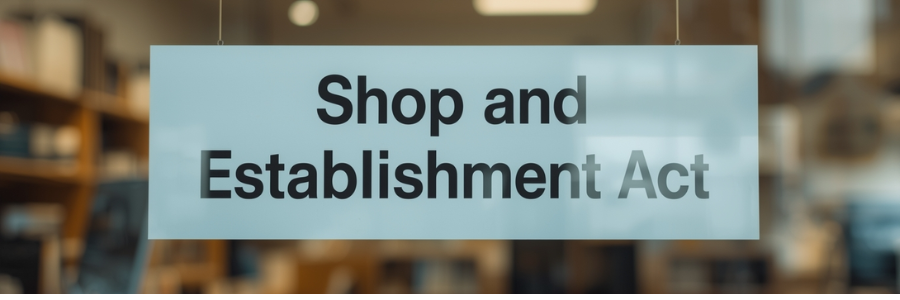Punishments for Not Registering Under the Shop and Establishment Act
Overview
State-level laws include the Shop and Establishment Act. It usually refers to giving workers a secure and cozy workplace. The Act covers the working conditions, hours, holidays, wages, and leave policies. It is necessary to register the shop establishment certificate in India. Registration provides the legal authorization, ensures compliance, and facilitates the process for business bank opening. Ignoring mandatory registration, however, can lead to a number of legal actions, the loss of government programs, and the inability to open a business bank account. Search how the unregistered commercial establishments face the challenges, including tips to avoid them.
1. An outline of the Shop and Establishment Act
The Act’s main goal is to protect employers’ and employees’ rights by establishing employment standards. The Act applies to various commercial establishments, whether it is shops, hotels, restaurants, or offices. It provides the regulations, such as hours, holidays, etc. For the female employees, maternity leave and other benefits are provided.
2. Why is Shop Registration Mandatory?
Here is the breakdown for license importance:
- A license ensures that your entity operates within a specific legal structure.
- To secure the other necessary registrations, the license is the primary document.
- A license proves a company’s legal existence in order to open a current bank account.
- It provides legal authorization to businesses and enhances trust with clients.
- To claim the government schemes and programs, a license is used.
3. What are the Non-Compliance benefits of a Shop Act License?
The non-compliance penalties imposed by State Labor Departments. It differs from state to state:
Imposed Monetary Fines
The fine penalties depend on the state and the disposition of the violation. The late registration or minor record-keeping issues can be mentioned as minor offenses. A fine of between Rs 100 and Rs 1000 may be imposed on the applicant.
For example, if you applied late for the shop license in Delhi, the fine can be imposed from Rs 25 to Rs 250.
However, in case the offense is bigger or serious, such as non-compliance with working condition rules or not paying for wages, it can be imposed. In this case, the fine can be between thousands and lakhs. On the other hand, the penalty will be applied every day if the authority finds a persistent violation. Under the Delhi Act, the fine will be imposed at Rs 5 per day.
Legal Warnings or Firm Suspension
The state’s authorities, including the Labor Department and its inspector, have the authority to control how businesses operate. These governing agencies have the authority to issue legal notices to employers for non-compliance with the Shop & Establishment Act. If the violation is bigger or involves breaking the government laws, the regulatory authority can issue a notice for business closure or suspension. It will impact business reputation and establishment registration.
Unable to secure Government Tenders or Business Loans
Non-compliance with the Shop Act license can result in the participant’s in government tenders. To join the government tenders, having a valid legal recognition is crucial. Apart from government tenders, to even secure a business loan, businesses need a valid license. The history of non-compliance can impact business reputation. This will reduce the credibility, which makes a negative impact on the eyes of banks. Although the firm may face the challenge of securing business loans or funding from banks or financial institutions.
Action for Repeat Offense
Repeatedly committing the same crime may result in harsh penalties from the state’s regulatory body. The continued non-compliance may result in a substantially higher fine:
For example, if they are non-compliant with the Tamil Nadu Act, they may need to pay Rs 5,000 if they are convicted for the first time. For the second time, an offense with the same authority can face the Rs 10,000 penalty.
Repeatedly committing the same crime may result in harsh penalties from the state’s regulatory body.
Cancellation of License Processing
If the state’s authority finds that the business is not in line with the laws or has a chance of committing a crime, it ultimately leads to cancellation of the shop establishment registration certificate. Ultimately, the company won’t be granted a license to conduct business lawfully.
Imprisonment for Bigger Offense
The controlling authority of the state may imprison the business operator and impose a heavy fine if the infraction is severe or cannot be deemed lawful.
User Query: Significance of Shop and Establishment Registration
4. What are the Consequences of non-compliance beyond fines?
Beyond fines or imprisonment, the operator might face additional significant challenges. The business might face a negative impact that will break the clients’ trust. You might face the difficulty of securing the other major licenses, such as GST, FSSAI, or PSARA licenses. Non-compliance further imbalances the internal environment of a company.
5. How to Avoid the Non-Compliance Challenges?
Follow these strategies to avoid the legal obligations:
Strategy 1: Register Business
According to the local Shop & Establishment Act, register your newly established business with the state’s controlling authority to get the Shop and Establishment license.
Strategy 2: Follow the Rules
Apart from the shop license registration, adherence to the state’s laws or regulations is important. Must align with the labor laws regarding working hours, leave policies, and other employee protections.
Strategy 3: Maintain Registers
Maintenance of employee registers is vital. Keep the attendance register accurate, provide leaves as mentioned in the laws, etc.
Sum Up | State-Wise Penalties for Unregistered Shops
To ensure fair and ethical business operations, the Shops & Establishment Act mandates the compulsory shop license registration. The legal framework of this act ensures the employee’s rights. Obtaining the license is not just a legal formality but is vital for businesses to grow and protect. A valid license is further important to avoid the legal penalties, including fines and potential closure. By timely registration, you can avoid unnecessary penalties and legal troubles. Consult a LegalRaasta expert, who will direct you to your end-service requirement, to streamline and expedite the registration process.
Frequently Asked Questions!
(a) Is shop and establishment registration compulsory in Delhi?
Ans. Yes, the registration for a shop license is mandatory in Delhi to operate commercial establishments. Must apply for the license within 90 days of the initiation operation.
(b) Are MSMEs also required to have a shop establishment license?
Ans. Yes, all MSMEs are also required to obtain the shop and establishment license. The license provides the legal existence within the state.
(c) How to cancel the shop license registration?
Ans. For the license cancellation, submission of a written closure notice is vital. Submit the closure note to the chief inspector of the respective state’s labor department within 15 days of the closure date.
(d) Which website is applicable for license cancellation?
Ans. You are required to fill out the cancellation form online through the state’s municipal corporation or labor department website.
(e) How long is a Gumasta license valid in Maharashtra?
Ans. The validity of the license depends on the employees. For establishments with 0-9 employees, the Gumasta license is valid for a lifetime. For the employees with above 9, it is valid for only one year.










